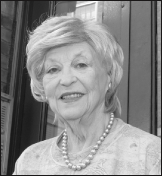By Melissa Korn
The building stands innocuous enough, its dingy dark brick facade punctuated by plain white windows climbing four floors high. But 135 MacDougal St. has become the center of an increasingly bitter tenant-landlord battle pitting eight residents against one of the city’s biggest landowners, New York University.
Among the tenants who have been told they must leave their apartments by Oct. 31 so that N.Y.U. Law School can have more office space is 85-year-old Jan Wallman, who has been in her rent-controlled apartment for 55 years. She currently pays $836.99 a month for her two-room apartment. The former manager of the original Duplex, which became Rose’s Turn, and the woman credited with discovering Woody Allen and Joan Rivers, Wallman is “the godmother of cabaret,” according to singer Cynthia Crane.
But Rose’s Turn is turning into offices, and Wallman is unsure of how N.Y.U. will find promised comparable accommodations by the time she’s evicted. The sprightly widow, with her blonde wig and glittering, multicolored cane, is beginning to see her half-century of Village history wiped out.
The nightmare started when the eight non-student tenants at 135 MacDougal received letters, dated June 19, from the Law School’s law firm, Kucher & Bruh, saying that their leases wouldn’t be renewed and that they would have to vacate by Oct. 31. N.Y.U. had applied to the state’s Division of Housing and Community Renewal, asking for permission to evict tenants under the Rent and Evictions Regulations, according to a letter D.H.C.R. sent to tenants.
That application said the Law School wants to occupy all the 135-137 MacDougal St. space, in particular, because of its proximity to the main campus, so that the recently expanded faculty can be centralized and centers and institutions can have adequate space. According to the eviction application, “The MacDougal building has emerged as the most feasible solution to support the Law School’s critical space needs and to advance its educational mission.”
Statements like that confused Wallman.
“For years,” she said, “they were carrying on about how they needed housing space for students.” She said that as non-university tenants moved out, the school had leased the empty apartments to students. The building is now about two-thirds students, by her count.
Wallman responded to her eviction notice in a July 24 letter explaining that she needed to stay in her apartment because of her tight budget — Social Security and a veteran’s widow pension totaling under $2,000 a month — and health issues, including osteoarthritis, asthma and three knee replacements. (One knee was redone after an infection.)
“Living near transportation and shopping is critical,” she wrote. “N.Y.U. Law School has offered me no specific options for relocation. My roots are in this community. I have no family on whom to call for assistance and must depend on friends for support.”
Since writing that letter, Wallman said she was contacted by Lillian Zalta, an N.Y.U. Law School administrator, who is slowly visiting the apartments in question to get a better sense of what the school will need to provide as it looks for the promised replacement housing.
Zalta was unavailable for comment.
Kelly Franklin, a university spokesperson, wrote in an e-mail, “The Law School is working with the tenants to find appropriate alternative housing.”
Even if the tenants are relocated to adequate replacement apartments, Wallman said there’s no guarantee they won’t be forced to move again. After all, two of the 135 MacDougal tenants were moved into the building by N.Y.U. because they had lived where the university’s Furman Hall (new Law School building) now stands.
Franklin stated in her e-mail that the timeline for eviction and relocation is “somewhat lengthy.” But for the tenants, that Oct. 31 deadline is looming large.
Resident Shirley Sealy Williamson, who was editor of the Law School’s alumni newsletter in the late 1980s, wrote a letter “beseeching” John Sexton, the university’s president and former Law School president, to “do the right thing by us.” According to her letter, N.Y.U. purchased the building in the early 1980s, almost 30 years after some of the tenants had moved in.
Under Sealy Williamson, the tenants formed the Provincetown Apartments Tenants’ Association and have retained legal representation. But because Wallman’s monthly income is less than the $2,000 requested to help pay legal fees, she has contacted a different firm in the hopes that it will represent her on a pro bono basis.
Although Wallman thinks it “may be a pie in the sky,” she and the other old-timers would like the Law School to allow them to remain but turn the rest of the apartments into offices. As the tenants leave — a fair number are getting on in years — their apartments can be turned over, too.
“If we cannot continue to live here, if we were forced to seek housing on the city’s open market, then the majority of us could not continue to live in New York City, our home for many decades,” Sealy Williamson stated in her letter. “To put it bluntly, we could no longer live here unless we were to become homeless street persons.”
Jan Wallman outside her building at 135 MacDougal St. where she has lived for 55 years.






































